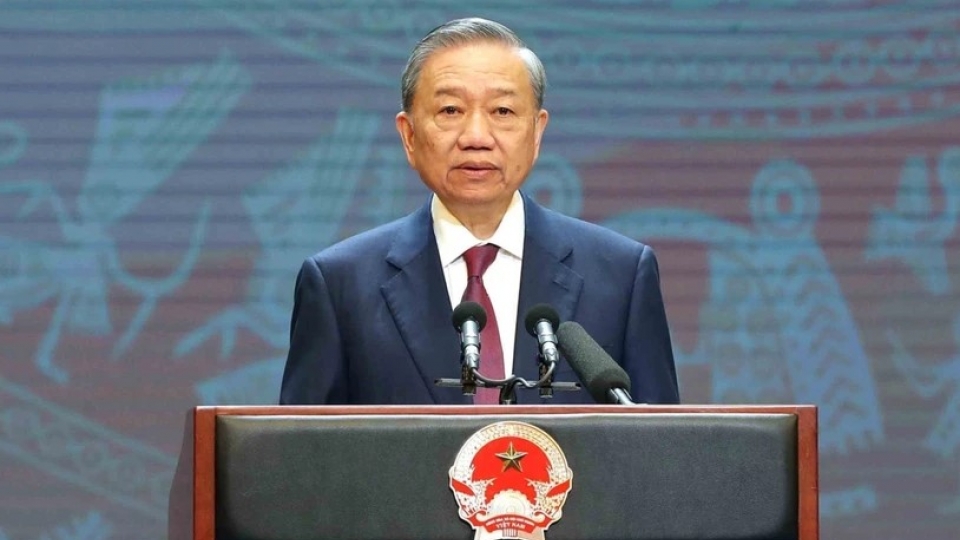Party chief calls for five key "connections" in Vietnam–Kazakhstan cooperation
General Secretary of the Communist Party of Vietnam (CPV) Central Committee To Lam visited and delivered a policy speech at the Academy of Public Administration under the President of Kazakhstan on May 6 evening (local time), as part of his state visit to the Central Asian nation.

In his speech, the Party leader stressed that the fresh establishment of a Strategic Partnership between the two countries has ushered in a new chapter in the bilateral relations.
Looking toward the future, he noted that the Strategic Partnership should be implemented through substantive and effective cooperation, thereby becoming a model of South-South collaboration between Southeast Asia and Central Asia.
To this end, and in order to implement the joint statement on upgrading the Vietnam–Kazakhstan relations, the Party General Secretary stressed that five key "connections" should be strengthened in the coming time.
First is the people-to-people connection, encompassing ties between the two countries’ leaders, institutions, and people. Within this framework, the two nations should enhance frequent and substantive high-level political dialogues, across all Party, State, parliamentary, and people-to-people channels. Existing cooperation mechanisms, such as the Vietnam–Kazakhstan intergovernmental committee and political consultation mechanisms between the two ministries of foreign affairs, should be utilised effectively. Both sides should also explore establishing new dialogue mechanisms in areas such as defence, security, trade, science-technology, and locality-to-locality cooperation. In addition, they should intensify joint work in education, arts and culture, and tourism, thus fostering mutual understanding, especially among the younger generations.
Second is the economic connection, aimed at maximising each country’s potential and strengths. The Party leader affirmed that Vietnam wishes to work with Kazakhstan to make economic, trade, and investment cooperation a vital pillar of the bilateral relationship, commensurate with both sides’ potential.
The two countries should actively explore opportunities to expand the exchange of Kazakhstan’s agricultural products and Vietnam’s seafood, while promoting cooperation in the mining sector. Vietnam expects Kazakhstan to share experience and cooperate in the development of international financial centres, he said. Infrastructure and transportation connectivity, as well as cooperation in other potential fields such as energy, should be promoted to capitalise on their geographical advantages. The two sides should take advantage of regional strengths and foster deeper ties between their national oil and gas corporations.
In particular, Kazakhstan was encouraged to introduce potential exploration and exploitation projects to the Vietnam National Industry - Energy Group (Petrovietnam). Cooperation in energy exploration, exploitation, and technology transfer could soon become a pillar of bilateral ties.
Policy coordination should also be strengthened through collaboration in education -training, sci-tech, and innovation. The two countries need to prioritise cooperation in training quality workforce, aiming to build a dynamic young generation with entrepreneurial skills and the capacity to integrate into the digital era. This generation will become a driving force for growth and a bridge between the two countries.
The General Secretary expressed hope that research institutes, universities, and enterprises of both countries would step up coordination in joint studies, especially in green technology, clean energy, and emerging technologies.
He also underscored the need to boost coordination between the Academy of Public Administration under the President of Kazakhstan and leading Vietnamese universities in public administration, economy, international relations, and leadership skills.
Strengthening information exchange, shared research, and forecasts on issues of mutual interest will yield practical benefits and help elevate bilateral relations to a new stage of development, he said.
He called for interregional connectivity and leveraging the roles and influence of both countries to expand cooperation between Southeast Asia and Central Asia, while also amplifying the standing and voice of Global South countries.
Both nations need to continue upholding multilateralism, safeguarding the legitimate interests of developing countries, and proactively contributing to the international community’s efforts to address global challenges such as climate change, energy security, water security, and food security, and the fight against terrorism and transnational crime, the leader said.
Vietnam and Kazakhstan will continue coordination and support for each other in international organisations and at multilateral forums. As an active member of ASEAN, Vietnam welcomes all efforts to promote cooperation between ASEAN and Kazakhstan, while standing ready to serve as a bridge to enhance and deepen relations between ASEAN, Southeast Asia, and Central Asia in a substantive, effective, and mutually beneficial manner.
The Party chief expressed his admiration for the socio-economic achievements that Kazakhstan has obtained over the past time, with significant contributions of the Academy of Public Administration under the President of Kazakhstan, stating he is confident that the academy will continue its key role in promoting education and scientific progress in the country and throughout the region.
According to the Vietnamese leader, the spirit of friendship, solidarity, and sincere cooperation forms the strong bond between Vietnam and Kazakhstan in the new era. With joint efforts, particularly those of the young generations, the Strategic Partnership between the two countries will continue to develop robustly and become a bridge fostering cooperation between Southeast Asia and Central Asia, bringing benefits to both nations' people while contributing to regional and global peace and stability.




